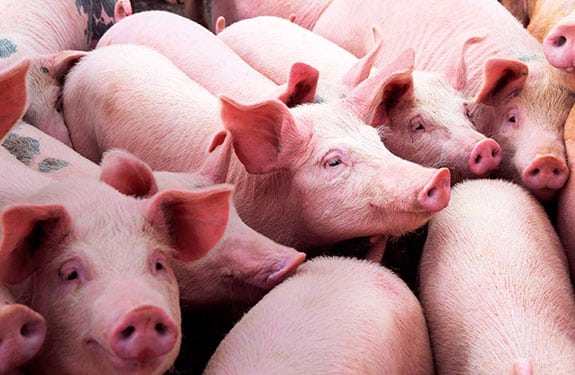27 Jun Yeast supplementation supports zero ZnO mission
By Wouter de Bruin, Western Europe manager swine, Phileo by Lesaffre

Today’s pig farms are increasingly managed with pig health, animal welfare and sustainability being top priorities. At the same time, pig feed prices are high, antibiotic use is further restricted and since June 1st, 2022, therapeutic levels of zinc oxide (ZnO) are no longer allowed in the EU. These challenges spur pig farmers and nutritionists to re-evaluate and re-think feed formulation, health management, and market strategy among others. With the addition of certain feed supplements, we can make a big difference for both the sow and the piglets. And while antibiotics and ZnO are on their return, the mission continues to increase resilience, immunity and health of pigs and only use medication for treatment of disease, and not to cover up poor management or health issues.
The power of yeast products
Phileo’s mission is to provide feed manufacturers and pig producers with nutritional tools to improve health and performance, while reducing the need for pharmaceuticals. One of these tools is the supplementation of probiotic yeast to reduce the need for therapeutic ZnO levels and antibiotic) in their operations, while producing healthy piglets and remaining profitable and sustainable.
Phileo’s ‘Program Zero ZnO’ is a three-step approach that focuses on strengthening the microbiome, reducing pathogen pressure, and enhancing feed intake. The backbone is the application of different types of yeast products, including the yeast probiotic Actisaf® (hereafter called probiotic yeast). It improves microbial population to benefit the sow’s and piglet’s health and feed efficiency by enhancing the environment in the hind gut. In addition, yeast postbiotic Safmannan® (hereafter called postbiotic yeast) is applied to reduce pathogen pressure and to prevent digestive disorders by binding bacteria such as E. coli. It also reduces the negative impact of inflammation on piglet performance.
Zero ZnO mission starts with the sow
Over the last five years, many trials in Europe have confirmed the benefits of applying the Program Zero ZnO. And more field trials have been done ever since, increasing high-quality evidence around the application of probiotic yeast and postbiotic yeast. One of the most recent trials was done in Spain and focused on sows. This is because the prolificacy of sows increases concerns weaning weights. With the ban on ZnO and the on-going pressure on the use of antibiotics, robust and heavy piglets at weaning are even more crucial than before. The sow’s diet can have a positive impact on embryo and foetus development and milk production among others. Earlier research work showed that the supplementation of yeast to sows promotes the development of the microbiome in her offspring and improves the quality of colostrum as well as the quality and quantity of milk. These are crucial factors influencing the performance of both sows and piglets until weaning.
The recent trial showed that supplementation of probiotic yeast during late gestation and lactation indeed improves the performance of hyper prolific sows and their progeny under commercial conditions. ADG in the yeast supplemented group was significantly higher (193 g/d) compared to the control group (171 g/d). Table 1 shows that important parameters around prolific sows are positively improved with the addition of yeast in the diet.
Continued support of yeast in piglet phase
ZnO used to be a way to compensate for low feed intakes and growth levels, as well as a tool to reduce the risk for developing post-weaning diarrhoea. But this is not allowed and needed anymore, as confirmed in a recent trial done in Ireland. This trial looked at the potential for yeast to eliminate therapeutic ZnO from piglet diets without compromising the zootechnical performance. In this study, under commercial conditions, followed the performance of piglets on a commercial diet including zinc oxide (zinc group) and piglets that received a commercial diet with a combination of probiotic yeast and postbiotic yeast (yeast group).
The aim of this trial was to have similar results between the two groups, demonstrating that ZnO can indeed be replaced by Phileo’s ‘Program Zero ZnO’. Keeping this in mind, the results show some differences in favour of the yeast supplemented group. The yeast group exceeded the average daily gain (ADG) in the creep and weaner stage (Figure 1). The average daily gain during the whole period was also higher in the piglet that received the yeast supplementation. The yeast group had a higher average daily feed intake (ADFI) during the creep and link stage, but not in the weaner stage. Yet, the zinc group showed a higher ADFI over the whole duration of the trial.
Conclusion
While there is no single bullet to replace ZnO and it does require a rethink and re-evaluation of piglet feeding and management practice. A more holistic approach is required that includes a healthy microbiome, limiting pathogen pressure, ensuring feed intake and more. The great news is that all these components can be improved with the application of the yeast-based feed additives that are presented in this article. The two recent trials discussed show that research continues to fine-tune nutritional tools to reduce the dependency on ZnO and antibiotics. New legislation in the pig industry might be challenging, but also spurs bright ideas in animal nutrition and powerful application in practice.









Sorry, the comment form is closed at this time.